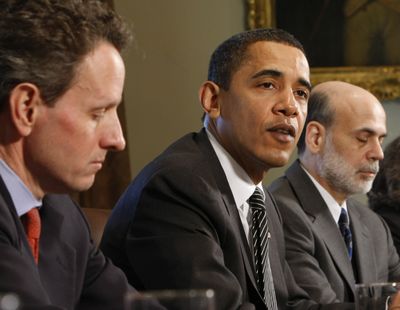Obama rolls out plan to buy up toxic mortgages
Goal is to free up credit; stock markets soar

WASHINGTON – The Obama administration aimed squarely at the crisis clogging the nation’s credit system Monday with a plan to take over up to $1 trillion in sour mortgage securities with the help of private investors. For once, Wall Street cheered.
The announcement filled in crucial blanks in the administration’s financial rescue package and formed what President Barack Obama called “one more critical element in our recovery.”
The coordinated effort by the Treasury Department, the Federal Reserve and the Federal Deposit Insurance Corp. relies on a mix of government and private money to help banks rid their balance sheets of real-estate related securities that are now extremely difficult to value.
The goal, Obama said, is to get banks lending again, so “families can get basic consumer loans, auto loans, student loans, (and so) that small businesses are able to finance themselves, and we can start getting this economy moving again.”
It was a huge gambit and one that came like a tonic to Wall Street, which had panned an earlier outline of the program that lacked detail.
Stocks soared, with the Dow Jones industrial average shooting up nearly 500 points, thanks to the bank-assets plan and a report showing an unexpected jump in home sales.
The fleshed-out plan is designed to help fix a value on damaged mortgage loans and other toxic securities.
The plan will take $75 billion to $100 billion from the government’s existing $700 billion Troubled Asset Relief Program. The government will pair this with private investments and loans from the FDIC and the Fed to generate $500 billion in purchasing power.
Treasury Secretary Timothy Geithner said purchases eventually could grow to $1 trillion – roughly half of the estimated $2 trillion of toxic assets on bank books now.
Under a typical transaction, for every $100 in soured mortgages being purchased from banks, the private sector would put up $7, which would be matched by $7 from the government. The remaining $86 would be covered by a government loan.
The plan was introduced ahead of a summit next week in London of 20 major and developing economies struggling with the global recession.
Obama is trying to get other wealthy countries to do more to stimulate their economies with government spending, as the United States has done. However, other countries, particularly ones in Europe, are resisting U.S. calls for more stimulus and would prefer to see more internationally coordinated bank regulation.
The administration was expected to outline its plan for financial regulation overhaul later this week.
Federal Deposit Insurance Corp. Chairman Sheila Bair said she expects her agency will finance as much as $500 billion in purchases of residential and commercial real estate loans.
Bair said the program should help banks clean up their balance sheets and raise fresh capital, though she added that “there may be some banks beyond help.” The agency has said before it expects more bank failures, she said.
A joint statement by the Federal Reserve and Treasury Department said the Fed should play a “central role” in preventing future financial crises. That implied a wish that Congress expand the Fed’s authority in regulating all financial institutions, not just banks.
Geithner said taxpayers still could lose money on the deal to soak up bad assets but there was no fixing the system without risk.
Other options, such as having the government purchase the securities outright or letting them languish on bank balance sheets, would pose even greater vulnerabilities, he said, and it was important to find the right blend of risk versus reward. “I am very confident this scheme dominates all the alternatives for trying to find that balance,” he said.
The sentiment was echoed by congressional Democrats, who said risk seemed inevitable with any plan big enough to work.
But House Republican Whip Eric Cantor of Virginia called Obama’s plan a “shell game” that hid the true cost.
He said he hoped the administration would consider instead an earlier Republican proposal to set up a government-sponsored insurance program for mortgage-related securities.
The administration plan “seems to offer little incentive for private investors to participate unless the subsidy is made so rich that it comes at the expense of the taxpayer,” Cantor said in a statement.